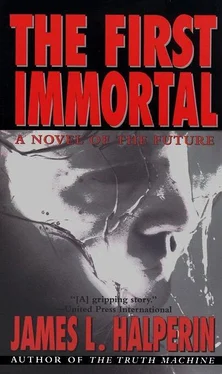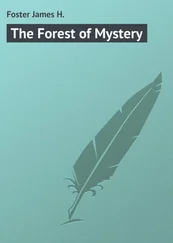“Well, don’t give up yet.” Stephanie rubbed my back. It helped. “She’ll be conscious within the hour. And she might be just fine.”
Some fifty minutes later at 1:47 A.M., Wendy stirred. Her first movements seemed lethargic, but I knew that was normal when coming out of general anesthesia. Then she wagged her tail, bounded from the cart, and leapt into my welcoming arms.
Yes. Lord, yes! She knew me! At least she still knew me. And for just that instant, it was enough.
The tiny crowd offered congratulations, an inspiring background of sound I could barely hear.
But were they premature? How could they know? They couldn’t administer the ultimate, empirical test; only I could do that. And as an undercurrent to my joy, a tide of fear dragged at me.
“Wendy, I need my remote activator.”
Wendy stood, scanned the room. At first she appeared confused.
Oh, God. Please.
Suddenly she bounded left to uncover the device I’d so carefully hidden, allowing me to dare believe. A moment later it was pressed to my hand.
“Wendy, I’d love a ginger ale.”
And sniff-sniff-sniff, pad-pad-pad, in under a minute the glass appeared on a tray in Wendy’s jaw.
The crowd cheered; Abel gleefully snatched the ginger ale and poured it over my head. But I didn’t notice or care. I was on the floor with Wendy-girl, weeping.
And Wendy’s contentment was unsurpassed. She seemed to remember none of the agony she’d endured only hours before, nor to notice that she was younger, sprier, healthier. All she knew was that she’d been a good, good dog, with whom I was well-pleased.
January 15, 2066
—Major League Baseball Commissioner Aki Fujiama decrees that all outfield fences be moved to a minimum distance of 485 feet from home plate, citing eugenics as the primary cause. “Over the past six years,” Fujiama explains, “the increase in home runs has created scores best described as laughable.” The commissioner made his final decision shortly after the San Antonio Silver Spurs defeated the Beijing Dragons 44 to 26 in the opening game of their all-night double header.—A recent groundbreaking announcement by Einstein Laboratories is eclipsed by revelations from competing organizations. Yesterday the Bakersfield, California, firm demonstrated a nuclear fusion process that safely and efficiently converts ordinary water into energy, allowing a single gallon to supply the annual power needs of a city the size of Denver. But teams in Bombay and Caracas now claim to have developed similar techniques which do not overlap the Einstein patents. Einstein’s stock, after rising 317% on yesterday’s trading, loses most of its gain by midnight’s close as a result of the previously unanticipated competition.—Teamsters Union President James Hoffa IV threatens to call a general strike of human VR imagineers unless their work week is reduced to 21 hours by the end of February. “We’ve endured brutal 23-hour schedules for almost two years, while other vocations have consistently afforded their workers increased leisure time.” A strike would have far-reaching repercussions across every industry and government branch, but could also backfire against the union by accelerating the cyberization of those jobs.
I glanced at the terrain screen and caught the Dallas skyline whizzing by. It would be another twenty minutes before I’d reach Los Angeles. Time to burn. Might as well be polite.
Besides, she was very attractive. I wondered how old she was. Virtually every adult I saw now appeared to be in their early twenties. But common perspectives and levels of maturity continued to serve compatibility, and there was still no way to arrest the cell-death clock. Therefore true age remained an important factor in the mating ritual.
“You and I are second cousins actually,” the woman on the 3-D screen told me, dashing all fantasies. “Which means we share a set of great-grandparents. Not that either of us knew them, of course, but I think I met your grandmother once. Rebecca Crane, right?”
Cousins? Oh well. “Yes.”
“She was—uh, is —my grandma Jan’s sister.” The slip was quite understandable; both matriarchs were now in biostasis, inhabiting that fuzzy tract between “are,” “were,” and “would be.”
“Sorry, what did you say your name was again?”
“Alica Banks.”
“Well, it’s nice to meet you, Cousin Alica Banks. And to what do I owe the pleasure of this call?”
“Desperation, actually. You’re the only one who can help me. At least I hope you can.”
“I hope so, too. But how?”
“My daughter’s about to earn her diploma. Harvard Graduate School of Design…”
“Congratulations!”
“Thanks. Sorry to brag; just can’t help it! Lysa graduates in June. She’s already been commissioned to design the lobby mural for BioTime’s new headquarters in Calcutta.”
“Impressive. Must be those Gary Franklin Smith genes. So what’s the problem?”
“Her other mother, Virginia. Virginia Gonzalez…”
“The neuroscientist?” A brilliant woman, I thought—if it was the same Virginia Gonzalez. What an honor it would be to help revive her .
“Why, yes! We were married. That is, until her skiing accident nine years ago. But I was wondering if maybe, well, I’ve seen all the news reports about nanorepair…”
“Yes?”
“Can you fix her injuries, bring her out of biostasis in time for our daughter’s graduation?”
I closed my eyes. I already had over a dozen revivifications scheduled for April, and thirty-eight more in May. I guessed I could squeeze in another routine reviv, but… “As I recall, she suffered a brain hemorrhage…”
“Yes, but it was in cold weather, and she was vitrified within six minutes of the accident.”
“Intriguing.” My mind began to race. Why the hell not? “They begin issuing permits next month. I could look at her chart. But you know, reviving someone from biostasis, well, that’s quite a commitment. So far we’ve only revived volunteer test subjects. We don’t know how easily regular citizens will adjust to—”
“I’m very familiar with the topic,” Alica interrupted me, “and I’ll do anything to help her. Still, it’s not like she’s been asleep for fifty years. Those death-row prisoners volunteered long before I was born. Half of them had never even heard of AI or nanotech.”
“True enough. The time frame’s more reasonable—less technological adjustment and all that. But have you really thought it through? She’ll still need reeducation, support, nurturing. Could be a full-time job, maybe for months. We can’t just revive people and expect them to function immediately. This isn’t like flipping a switch.”
“I understand all that.”
“You mentioned that she was your spouse, right? Does that mean you two are divorced now?”
“No, oh no, I meant, she is. But, well…”
“Yes?”
“Four years ago, I married someone else. A man.”
I felt a wave of vertigo. I’d thought myself immunized against future shock. What a strange time we were entering. Had anyone really begun to imagine it? “And have you told your new husband you’re planning to revive your, uh, wife?”
“Not yet. But I will, as soon as you tell me when.”
As I studied Virginia Gonzalez’s medical chart on the screen, I couldn’t help admiring Alica Banks, and the undertaking she was about to assume. It might have been akin, I thought, to sending for relatives after immigrating to the United States during the nineteenth century.
I considered my own family in biostasis, and doubted I was up to the task, at least not now. Both of my parents were permanently lost. I had no brothers or sisters. Aunt Katie, well, I never knew her; she’d been frozen six years before I was born. My great-uncle, Gary Franklin Smith, had been underwater for two hours by the time the medevacs had rescued him. His brain was probably mush. Grandmother’s mind had started to fade at the end, so I decided it might be better to wait until brain-restoration techniques had improved. Or was I rationalizing because I didn’t want to put myself through it then? And my great-grandfather, Benjamin Smith, and great-great-grandmother, Alice Smith, both at the Phoenix, seemed so far removed from my own reality that I’d never even considered reviving them.
Читать дальше












